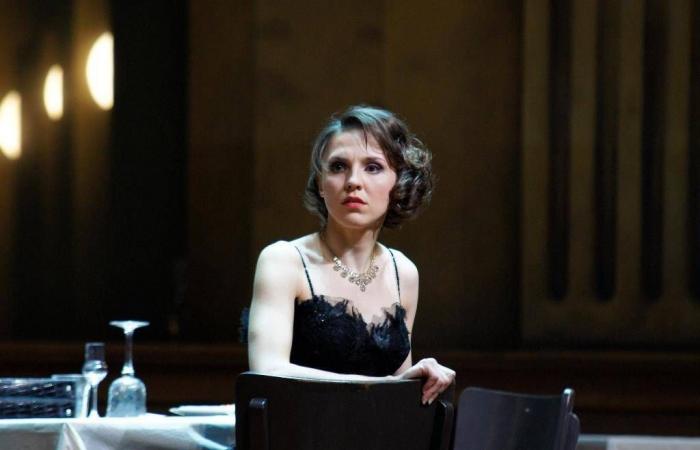Having debuted at the Vienna State Opera with Mozart, in the role of the Queen of the Night with stratospheric high notes, established not far from the capital with her husband and two children, Olesya Golovneva has completed the relatively classic career of a singer. initially classified as a “lyrical soprano” and “coloratura soprano” before evolving towards heavier roles, particularly in bel canto. She cites Anna Bolena, Maria Stuarda, Lucia di Lammermoor. Among many jobs, she has also sung Gilda, Violetta in La traviata, Rusalka, and recently the character of Silvana in Ottorino Respighi’s La fiamma – a role she took on last October at the Deutsche Oper Berlin.
This little-known opera, which will inevitably be difficult to identify and where she plays the daughter of an unjustly condemned witch, apparently upset her. “I was called at the last minute for a replacement and learned the role within a few days. It’s far from bel canto, you have to resort to the chest voice at times and there are shouts – even if we have large lyrical arcs to sing and a small section reminiscent of Monteverdi. It’s truly fantastic theatrical material, between tears and laughter, and it’s the most dramatic role I’ve sung to date. You have to go through the orchestra which is even more dense than with Richard Strauss in Salomé. »
We feel her vibrate with the characters she portrays on stage. She says that you have to be inspired by everything, from your readings, from painting, from everything you encounter in life. But his family roots remain the primary source. She was born in Pskov in Russia, “a provincial town located between Riga and Saint Petersburg near the border with Estonia,” explains Olesya Golovneva. There are no professional musicians in my family, but my mother and father always really liked popular music – as did one of my grandfathers. They played the accordion and I sang with them. I also sang at school, and performed melodies in a Pushkin club. »
Just like Tatiana in Eugene Onegin, the 15-year-old spent a lot of time alone in nature. “I identified with his dreams, with his thoughts. I loved getting lost in readings. » Olesya Golovneva ended up singing the role of Tatiana in Cologne, Helsinki, Hamburg; and Tchaikovsky’s cult opera built around seven “lyrical scenes” remains his favorite.
She trained as a singer at the Saint Petersburg Conservatory for seven years. “I didn’t sing at all in Russia, I only studied there and I passed my final exam with the role of Violetta Valéry in La traviata. » Her first engagement was almost twenty years ago: Queen of the Night, from The Magic Flute, in Vienna. “I was 25, I wanted to stay at home, I was like Tatiana! But my mother told me that I had to leave and that it was an opportunity to seize. Of course, the mentality in Austria was very different from that in Russia, and I didn’t speak German… You have to know how to take risks in life. » But here she is again engaging with the great Russian authors. “Russian culture is inside me. I grew up like that. I am proud of Russian culture even if I have not set foot in Russia for three years because of “this sad story”… I also studied drama. Constantin Stanislavski, Vladimir Nemirovitch-Danchenko, Mikhail Chekhov are references for me, and naturally Anton Chekhov whose plays I have read. »
I am proud of Russian culture, even if I have not set foot in Russia for three years because of this “sad story”…
After Pushkin, she went through a Dostoyevsky phase. “For three to four years, I only read his novels. I was reading on the bus, in my student hostel… What’s interesting about Dostoyevsky are the questions he asks, but he doesn’t give you the keys to solving them. These answers are up to you to find, to seek them, in your heart, in your soul, in your mind. These are very deep philosophical questions and they open the horizons. » Olesya Golovneva draws inspiration from these novel characters for her work on stage. About Salomé – one of the most provocative roles in the repertoire, who performs the dance of the seven veils under the lustful eyes of her father-in-law Herod to obtain the head of Iokanaan – the soft-spoken and thoughtful singer attempts to understand his motivations. “I wondered if she was under the influence of drugs or alcohol. She doesn’t seem very lucid in what she says and the way she behaves. The music of Richard Strauss is comparable to an ecstasy, it seems as if it is driven by a sexual impulse which surpasses it. I imagine that Salomé was abused as a child or exposed to sexuality at an early age and is a broken child. It expresses the dark side that every human being has buried deep within themselves. Everything she says is sexual in nature and refers to the erotic relationship between a man and a woman. She manipulates the young Syrian captain Narraboth through her sole force of sexual attraction. » Olesya Golovneva thought so much about the subject that she came up with a variation for the ending. “If I were a director, I would have Salomé put Iokanaan to death herself. The guard would not dare kill him at the bottom of the cistern and would drop his sword – as Salomé supposes at one point in the opera’s libretto. And when Iokanaan came up from the cistern, it was Salome who would kill him after kissing his mouth and she would put his head on a silver platter. That would make things even stranger and bloodier. She would exceed all limits! »
Still in her quest for meaning, Olesya Golovneva thinks that what fuels the attraction of the princess of Babylon for the young prophet is something other than carnal and erotic desire. “Iokanaan is an ascetic. He is pure, untouched by depravity, promised to the kingdom of God. And this purity fascinates Salomé, because somewhere deep inside, she longs for redemption. She says that “the moon has the beauty of a virgin who has remained pure.” And that’s probably why she wants to touch Iokanaan, touch his skin, touch his hair, and kiss his mouth. Because it is pure. She does not understand that this sought-after virginity is neither human nor sensual. »
-Definitely very aware of the issues underlying the approach to her roles, Olesya Golovneva believes that “when you play a bad person, you have to look for where she is good”. She hates “one-dimensional” approaches, and it is this diversity of humans that fascinates her. She also says that theatrical embodiment is what takes precedence over strict vocal performance. “First I act, and then I sing, because I like spoken theater. I did it for six years with a very good teacher.” And in a soft voice, full of empathy, she sends us off by advising us to read The Brothers Karamazov or Dostoyevsky’s Demons – “even if it’s a little harsh”!
Born in Russia, the soprano Olesya Golovneva studied in Saint-Petersgourg and in Vienna, a city where she began her career by joining the Staatsoper troupe, launched by the role of the Queen of the Night in The Magic Flute, which she will perform throughout Europe. Her repertoire today includes several major roles: Violetta (La traviata), Lucia di Lammermoor, Tatiana (Eugène Onegin), Anna Bolena, Mimi (La Bohème), Rusalka or Valentine (Les Huguenots), to name just a few. -uns.
Salome at the Grand Théâtre de Genève
From January 22 to February 2, 2025
Site
Ticketing






